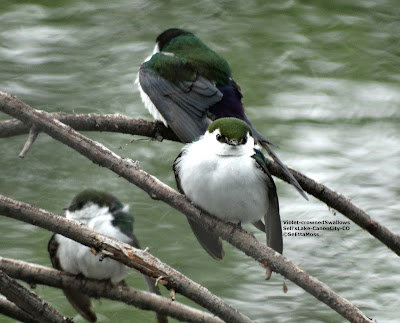No refuge, food for migrating warblers due to Ike
From the Chronical.com:
"Thousands of migrating warblers pass through the Bolivar Peninsula about this time every year, making one last stop for food and water before their 600-mile flight over the Gulf of Mexico.
But the warblers and other migratory birds might not be able to find refuge for a while on the remote and particularly vulnerable place. Hurricane Ike stripped the birds' favorite mulberry trees, leaving little fuel for their long journey ahead — one of the sobering consequences of the storm.
-------
Up to 20 miles inland, post-Ike samples showed salt levels as much as 25 parts per thousand in water that usually has no salinity. Water begins to taste salty at 6 parts per thousand, Sutherlin said.
"That exasperates everything that needs freshwater," he said. "If we don't get a lot of rain soon, then it's gloom and doom for fish, insects and some mammals. For birds, as soon as the water is freshened, they will move back in."
At this point, there is much concern over the plight of an astonishing variety of birds — from hawks to hummingbirds — that stop along the upper Texas coast on their way south for the winter.
"This will have a huge impact on the birds," said Gina Donovan, executive director of the Houston Audubon Society. "The warblers eat so many berries that the juice gets all over their feathers. It's like watching a child eat ice cream. Without the food to fatten them for a 600-mile journey, the birds will starve and perish."
Among the many rookeries on the Bolivar Peninsula, the Houston Audubon Society's sanctuaries are covered with debris from destroyed houses and boats.
The trees — those still standing — look like toothpicks, and there are fewer birds than usual." Read the full article
"Thousands of migrating warblers pass through the Bolivar Peninsula about this time every year, making one last stop for food and water before their 600-mile flight over the Gulf of Mexico.
But the warblers and other migratory birds might not be able to find refuge for a while on the remote and particularly vulnerable place. Hurricane Ike stripped the birds' favorite mulberry trees, leaving little fuel for their long journey ahead — one of the sobering consequences of the storm.
-------
Up to 20 miles inland, post-Ike samples showed salt levels as much as 25 parts per thousand in water that usually has no salinity. Water begins to taste salty at 6 parts per thousand, Sutherlin said.
"That exasperates everything that needs freshwater," he said. "If we don't get a lot of rain soon, then it's gloom and doom for fish, insects and some mammals. For birds, as soon as the water is freshened, they will move back in."
At this point, there is much concern over the plight of an astonishing variety of birds — from hawks to hummingbirds — that stop along the upper Texas coast on their way south for the winter.
"This will have a huge impact on the birds," said Gina Donovan, executive director of the Houston Audubon Society. "The warblers eat so many berries that the juice gets all over their feathers. It's like watching a child eat ice cream. Without the food to fatten them for a 600-mile journey, the birds will starve and perish."
Among the many rookeries on the Bolivar Peninsula, the Houston Audubon Society's sanctuaries are covered with debris from destroyed houses and boats.
The trees — those still standing — look like toothpicks, and there are fewer birds than usual." Read the full article


Comments